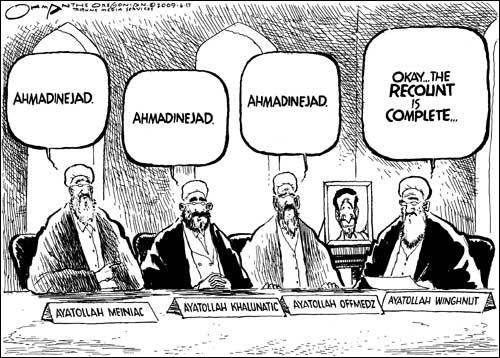Because according to the red cross, there is no cause and effect - there's poor Arabs and evil Zionist regime.
Because when you live and breath hatered to Jews, you are rewarded with high ranking jobs at the red cross.

See no evil, hear no evil. It's da jooooooooos
Because it is apparently normal and humanitarially acceptable to bombard Jewish civilian population indiscriminately and without reason.
Because it is no longer the role of the red cross to visit "war captives" . Even though it is an abduction, it is one of their main roles, to visit and assure Shalit's rights as a war captive.
Because the red cross could just as well still argue the Nazis are treating the Jews in the sham ghetto very well. The orchestra of the orphaned children was wonderful.
Please read: The Red Cross and the Holocaust

Look at the happy orphans:

Jerusalem blasts Red Cross for report
srael rejected as "scandalous" a highly critical report released by the International Committee of the Red Cross on Monday marking six months since Operation Cast Lead, saying it was inconceivable that the document would chastise Israel for the situation in Gaza while ignoring the continued detention of IDF soldier Gilad Schalit or the "intransigent belligerence" of Hamas.
According to the report, residents of the Strip are "living in desperation" due to their "daily struggle for existence."
"Gazans still cannot rebuild their lives," the report reads. "Most people struggle to make ends meet. Seriously ill patients face great difficulty obtaining the treatment they need. Many children suffer from deep psychological problems. Civilians whose homes and belongings were destroyed during the conflict are unable to recover," the ICRC maintained.
"During the 22 days of the Israeli military operation, nowhere in Gaza was safe for civilians. Hospitals were overwhelmed with casualties, including small children, women and elderly people. Medical personnel showed incredible courage and determination, working around the clock to save lives in extremely difficult circumstances.
Meanwhile, daily rocket attacks launched from Gaza put thousands of residents at risk in southern Israel. Medical workers in Israel provided care for the traumatized population and treated and evacuated casualties," the Red Cross report said.
Foreign Ministry spokesman Yigal Palmor said it was "scandalous" that the report "completely ignored the detention of an Israeli hostage under absolute isolation for three years, and in breach of every elementary human right."
Palmor said the Red Cross had failed miserably in its responsibility to visit prisoners. "What is more, it evades the question of his [Schalit's] inhuman detention and of the role of that case in bringing about the current crisis," said.
Palmor said the crisis in Gaza had been brought on by "the Hamas junta," and that the Red Cross knew perfectly well "what Hamas needs to do to dramatically improve the situation."
Disregarding Schalit and Hamas in a report on the Gaza Strip, Palmor said, "does not add to the credibility of the Red Cross's important mission, nor does it contribute to finding a real solution to the Gaza problem."
The "bread and butter" of the Red Cross mission was to visit prisoners, and its failure to visit Schalit reflected poorly on the organization, Palmor said.
According to the ICRC report, "Israel's military operation left thousands of homes partly or totally destroyed. Whole neighborhoods were turned into rubble. Schools, kindergartens, hospitals and fire and ambulance stations were damaged by shelling. This small coastal strip is cut off from the outside world. Even before the latest hostilities, drastic restrictions on the movement of people and goods imposed by the Israeli authorities... Insufficient cooperation between the Palestinian Authority in Ramallah and the Hamas administration in Gaza had also hit the provision of essential services."
The authors claimed that even though $4.5 billion worth of goods have been promised the Palestinians in Gaza, little will come of the aid as the transfer of goods into the Strip is severely limited by Israel.
"In May 2009, only 2,662 truckloads of goods entered Gaza from Israel, a decrease of almost 80 percent compared to the 11,392 truckloads allowed in during April 2007, before Hamas took over the territory."
Environmental problems continue in Gaza, the report said. "Every day, 69 million liters of partially treated or completely untreated sewage - the equivalent of 28 Olympic-size swimming pools - are pumped directly into the Mediterranean because they cannot be treated."
As for medical care, "Gaza's health-care system cannot provide the treatment that many patients suffering from serious illness require. Tragically, a number of them are not allowed to leave the Strip in time to seek health care elsewhere. Health issues in Gaza are often politicized and patients find themselves caught up in a bureaucratic maze. The procedures for requesting permission to leave the territory are complicated and involve both the Palestinian and Israeli authorities. Seriously ill patients sometimes have to wait for months before the relevant authorities allow them to leave the Gaza Strip."
In addition, said the ICRC, "an estimated 100-150 people who lost limbs in the recent military operation are waiting to be fitted with artificial limbs."
One of the most serious consequences of the closure is soaring unemployment, which reached 44% in April 2009, the report continued. The collapse of the Gaza economy has led to a dramatic increase in poverty. An ICRC household survey conducted in May 2008 showed that, even then, more than 70% of Gazans were living in poverty, with monthly incomes of less than $250 for a family of seven to nine members, the report said.
The closure has also badly hit farming families, which make up over a quarter of Gaza's population, the authors of the report contended. "Exports of strawberries, cherry tomatoes and cut flowers used to be an important source of income. They have come to a virtual standstill."
In addition to ignoring Schalit and Hamas, the ICRC report also glazes over the effects of terrorists' missiles on hundreds of thousands of Israelis living in the South.
An in-depth study headed by Dr. Ruth Pat-Horenczyk of the Israel Center for the Treatment of Psychotrauma was delivered Monday, on the second day of an International Conference on Trauma in Early Childhood at the Hebrew University's Mount Scopus campus in Jerusalem.
She and her colleagues interviewed hundreds of children and their parents who live in Sderot - which was under constant attack for years before, during and even since Cast Lead ended. Pat-Horenczyk said many of them still suffered from post-traumatic syndrome symptoms including sleep difficulties, aggression, pains, lack of interest in what they previously enjoyed, avoidance of places and things that remind them of trauma, and other phenomena.






 Away From The Sun
Away From The Sun




























